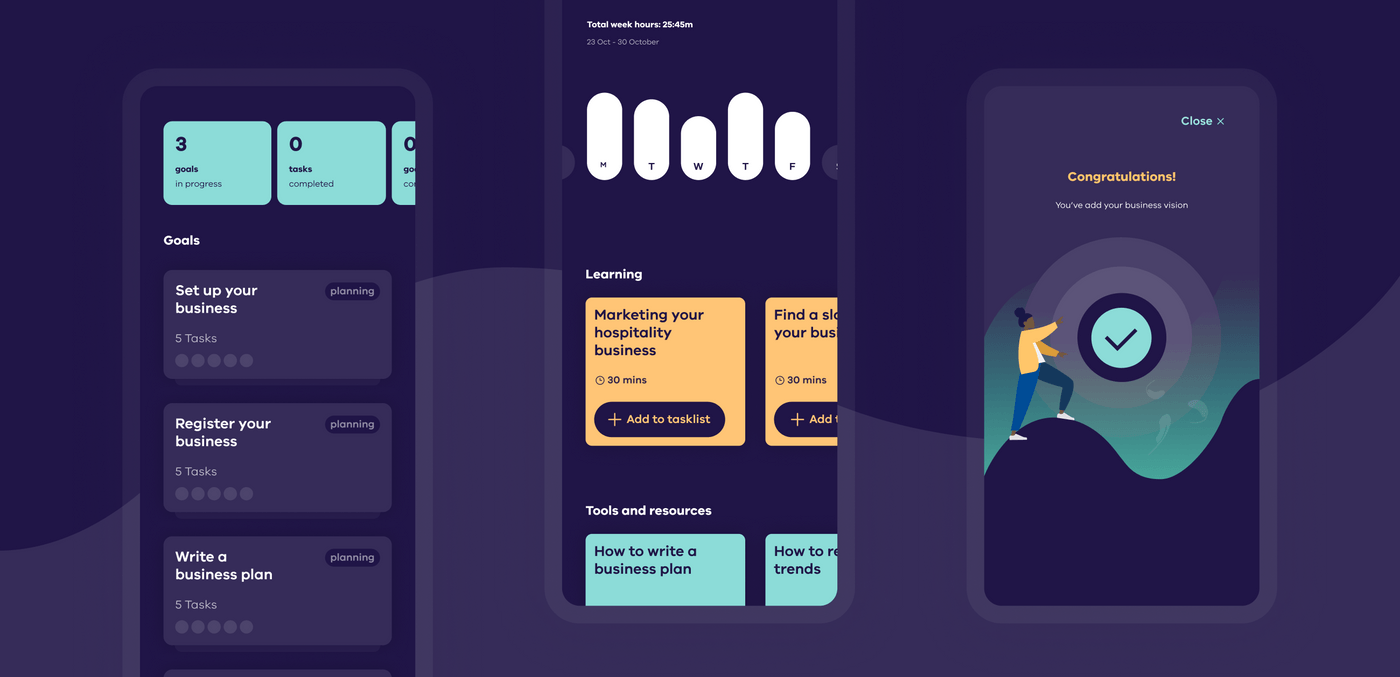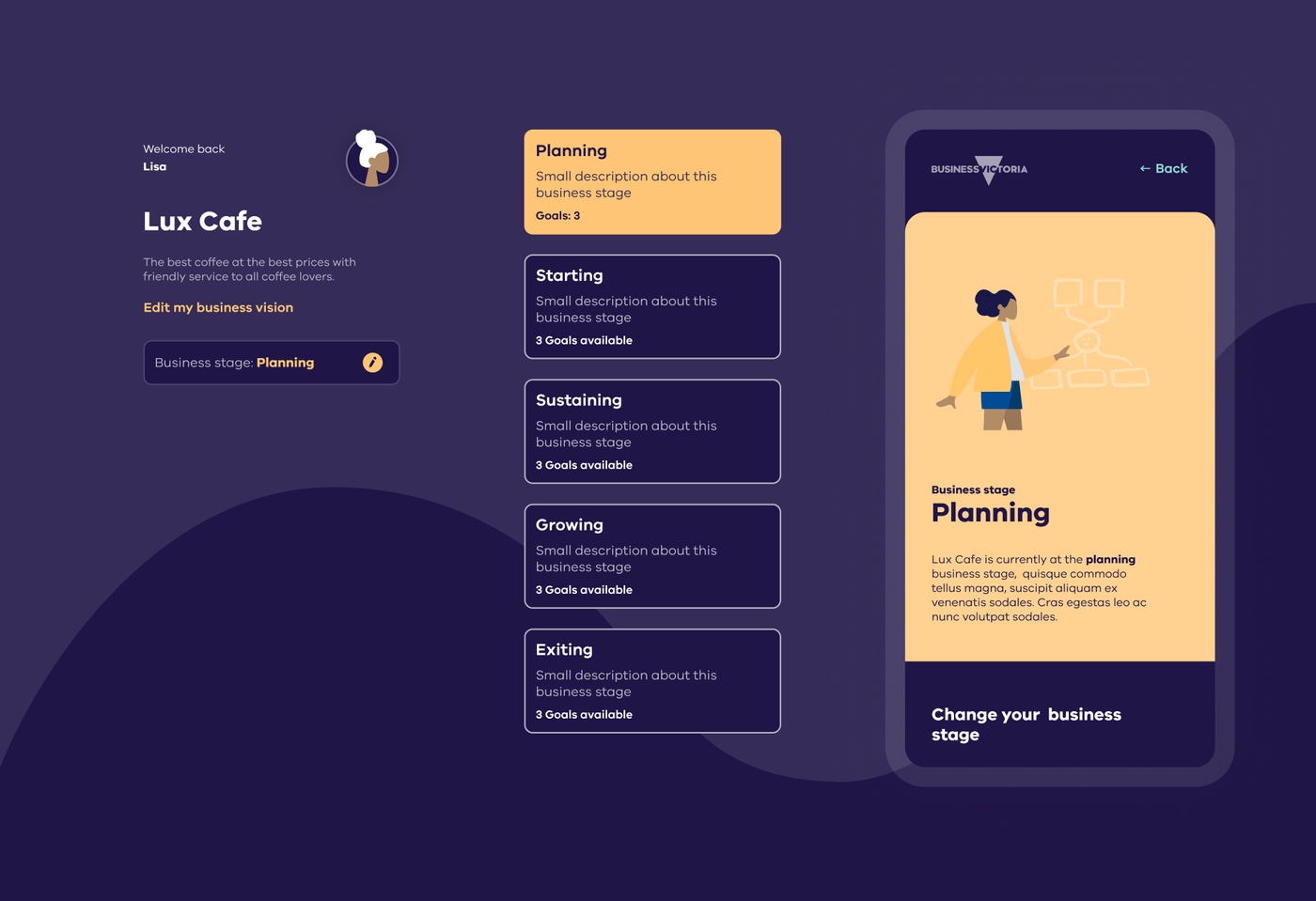Small Business Victoria, part of the Jobs, Innovation and Business Engagement group within the Department of Jobs, Precincts and Regions, helps businesses to plan, commence and grow by providing information and assistance through expert business advice and low cost and local skills development training opportunities. They provide small businesses with access to wellbeing and mental health support, business recovery and resilience mentoring and the opportunity to upskill and receive individual and group coaching services amongst other services.
The small business sector is the engine room for the Victorian economy. It accounts for 98% of all businesses, drives over a third of the Victorian economy, and is essential to contributing to Victoria’s economic growth and employment opportunities. Therefore, supporting the growth, sustainability and success of small businesses is vital to Victoria’s ongoing economic strength.
In mid-2018, Small Business Victoria engaged Portable to investigate the ways in which capability uplift and behaviour change amongst small business owners could be supported through an online learning intervention.
We began this engagement with a discovery research phase, exploring this as a research question which was later followed by a design and prototyping phase in 2019. With the world dramatically changing in 2020 as a result of the bushfire crisis and the pandemic impacting Victoria’s small businesses, the Portable team worked again with Small Business Victoria to revisit this research and the prototypes for a new Business Planning Tool in the light of this new context. Our work across these discovery and design phases laid the groundwork for the digital development and launch of this new Business Planning Tool in 2021, with our design team working alongside the development team at Today during implementation.
Research approach
Small Business Victoria came to us with a research question that directed the efforts of this research phase: How can we build capability and behaviour change through online learning?
Stakeholder engagement
To begin, we had to understand the skills and knowledge gaps of small businesses at different stages of the business lifecycle. Through conversations with local governments, small business advisors and a statewide survey that collected over 1000 responses, we began to understand these skill and knowledge gaps, as well as capture how businesses preferred to learn online.
Desktop research
Literature and case studies around online learning, digital engagement and peer to peer learning all began to inform and shape opportunity areas for design direction. Paired with our research on the ground, we formed recommendations that the design direction needed to allow learning to happen at anytime, provide tailored content, facilitate face to face interactions and promote positive behaviour change.
Engaging with subject matter experts
Working with a behavioural psychologist placed an insightful and interesting lens on the project. There would be no use having all the learning material available online if businesses still didn’t see the value in engaging with it. Hence, we explored what features would drive engagement and behavioural change such as promoting self-efficacy (social cognitive theory), which is the innate ability to achieve goals by presenting users with easy to accomplish tasks and information.
Design hypothesis
Desktop research, paired with qualitative and quantitative research methods catalysed our design hypothesis: An online platform enabling users to learn new skills, connect with other businesses, and plan and track their progress to increase the success of their small business.
Findings and opportunities from the discovery phase
We summarised and presented our findings to Small Business Victoria and evidence-based recommendations for the online learning platform. Our team identified four key areas and opportunities to support small businesses in their growth and uplifting their capability.
- Digital engagement: Across the planning and starting phases of their business they have little time to learn new skills and source information. Create a platform that provides them access to targeted information and learning materials in an accessible and efficient format.
- Online learning: Business planning is important during the start-up stage of a business life cycle, but businesses often forget to revisit and update these plans as time goes by. This can lead to a lack of agility and stability if a business landscape or market suddenly shifts. Create a tool that will take the information from their business profiles and continually learn from their activity within the platform, to create tailored experiences that present them with content that is relevant to their sector, region, and stage of the business life cycle.
- Peer to peer: 52% of small business owners responding to the research survey said that they currently go to other small business owners for advice. A successful online learning platform for small businesses will need to build learning communities and enable the transfer of knowledge and resources between users.
- Behavioural change: Small businesses may have a variety of blockers that inhibit their planning, capability building and learning. Create a platform that promotes behavioural change by setting social norms, promotes self-efficacy, cultivates a mindset of resilience, makes planning and monitoring enjoyable and supports small business owners with building a plan for their future.
Approach to prototyping and testing
The initial research phase informed the first proof of concept prototype which we would iterate on in subsequent phases of engagement.

Proof of concept design
We designed, user tested and refined prototypes which explored a prototype for the new digital platform and business planning tool which visualised how small business owners could:
- Plan: Set a vision for success and the goals to get there
- Track and respond: Track progress against goals and respond to changes
- Learn and connect: Find opportunities to improve capabilities, formally and informally
Revisiting the proof of concept in 2020
Small Business Victoria then worked with Portable again in 2020 to further validate the proof of concept design and explore the possibility of building the application. Small Business Victoria also wanted to consider how it could best support small businesses who were recovering from the bushfire crisis and those impacted by the evolving COVID-19 context. Key findings revealed that many small businesses were now in survival mode and that businesses were, now more than ever, in need of clear and tailored support from trustworthy sources.
User stories
The research taken in 2020 to update and refine the business planning tool prototype helped inform and define priority features and user stories for the business planning tool and updates to the proof of concept design, such as:
- “As a small business owner, I want help setting realistic goals, so that I can see progress and build confidence.”
- “As a small business owner, I want information from a trusted source in simple language, so I can confidently make decisions.”
Design system
To ensure that the Business Planning Tool was ready for MVP development, our Experience Design team updated the 2018 proof of concept designs and further iterated on these to create a comprehensive visual design system detailing user flows and visualising the components and layout of key features, including headlines and what key screens would look like in the platform such as the user dashboard, support groups area and the flow for new users setting up a profile.

Technical scoping
As part of the update to research in 2020, a further objective was to undertake technical scoping to determine what features were feasible for delivery in an initial minimum viable product release and identify what technical infrastructure was required to support its implementation and any limitations or needs that this placed on the design.
Technical solution design
Our Technology team is experienced in undertaking current state analysis of the technical ecosystems of our clients and then providing assessments of a technical solution design that will conform to best practice principles of Performance, Reliability, Availability and Scalability. Through an assessment of the prioritised features for the MVP and identified content types, we were able to produce Small Business Victoria with clear technical documentation and guidance on the proposed technical architecture for the business planning tool accompanied by a series of solution diagrams to guide development partners.
As part of this, we identified the need for a range of content and user APIs to assist in pulling content from other parts of the Small Business Victoria technical ecosystem to pass through to the front end of the web application and bring across user generated content and user profile information, as well as recommendations on user management and authentication processes.
Working in partnership with the build team
Portable supported Small Business Victoria and their development partners, Today on the successful build and launch of the tool, providing advisory and support in the areas of Research and strategy, Design and technical implementation. We worked them to further validate and refine the minimum viable product, priority features and the further development of the journey a business takes to set a goal and track their progress against these goals in an engaging and interactive way.
Outcomes
Through our research engagement, employing a human-centred approach to the investigation of the needs of small business owners, we have informed the visual design and technical solution design of a comprehensive, engaging, dynamic and highly accessible web application.
The Business Planning Tool will continue to grow and evolve over time as it supports small business owners across Victoria to plan, track and learn how to best succeed in growing and sustaining their business.